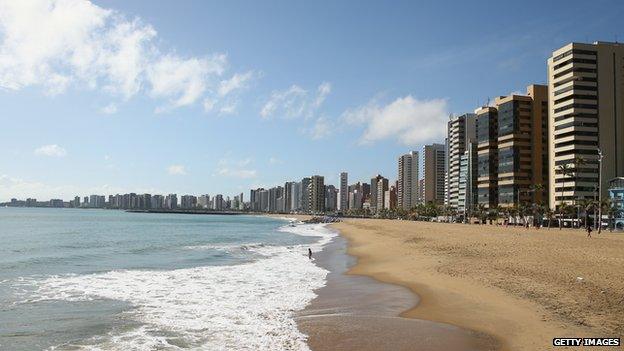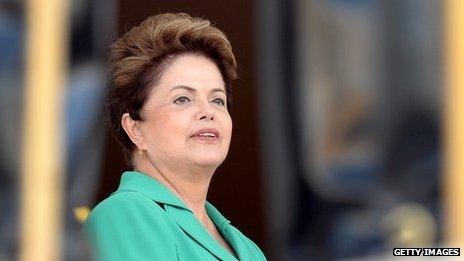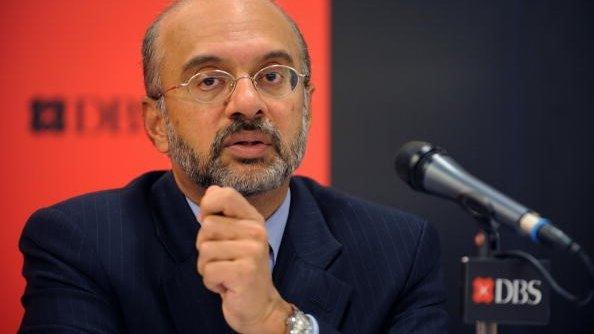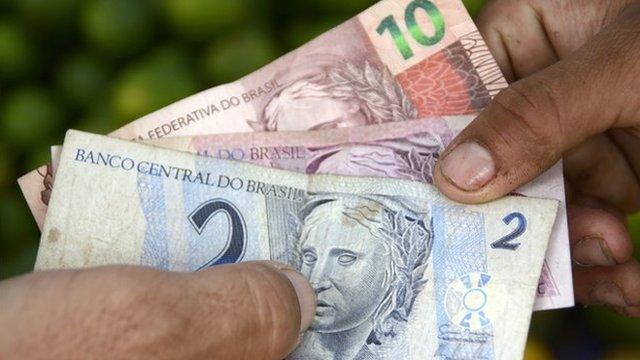Brics: Building a new development bank
- Published

Fortaleza in Brazil is set to host this month's Brics summit
The Brics countries - Brazil, Russia, India, China and South Africa - are one of the stranger international groupings.
The idea came from an economist, Jim O'Neill formerly of Goldman Sachs, who thought of the group (without South Africa) as a useful way of thinking about the future of the global economy.
On those rather flimsy foundations the countries built a summit and now they seem to be on the point of creating a new financial institution.
If they can agree to sign up to it at a summit in Fortaleza in Brazil, the five Brics countries will create a new development bank, a new challenger to the World Bank and the ranks of other similar regionally focused agencies.
They are all agreed in principle that it's something they want to do, and reports ahead of the summit suggest they are close to agreeing enough of the detail to be able to sign a founding treaty for the bank.
Growing demand
So just what will this Brics bank look like?
A lot of detail has still to be filled in, but previous summit declarations , externalhave set out some elements.
Its main function would be to mobilise "resources for infrastructure and sustainable development projects in Brics and other emerging economies and developing countries".
So it would be for the benefit of their own economies, but for others too.
Infrastructure is one of the jobs that the existing development banks do. They lend money to a government to pay for projects such as power stations and electricity supply grids, ports, roads, telecommunications networks, water and sewerage.
A Brics bank would bring more resources into this important area. The World Bank acknowledges that more is needed. There's a gap between what is spent on infrastructure and what is needed.
The World Bank says on its website, external: "The gap is estimated at $1 trillion in low and middle-income countries, and the demand for infrastructure continues to grow as countries develop."
The existing development banks could not get anywhere near filling a gap of that size. Currently overseas aid, including the existing multilateral development banks, provide a small fraction of total infrastructure spending in the developing world - something like $40-60bn (£23-35bn) out of a total approaching a trillion, external.
A group of three economists including the Nobel Prize winner Joseph Stiglitz have described, external the Brics bank as "an idea whose time has come".
They saw another benefit in the idea. They wrote with the global financial crisis still in mind, a disaster where one element was money from the emerging world invested in rich country financial markets.
"Such a bank could play a strong role in rebalancing the world economy by channelling hard-earned savings in emerging markets and developing countries to more productive uses than funding bubbles in rich-country housing markets," they said.

Brazil's Dilma Rousseff hopes the Brics summit will see agreement on a new bank
A significant contribution
So how much will a Brics bank be able to bring to the infrastructure party?
There are many moving parts in the calculation. The Brics countries are talking about total capital of as much as $100bn, though it wouldn't necessarily all be paid in.
The bank's capacity to lend would depend on how much they do pay in, its credit rating, whether it gets contributions from other countries, which Brics countries have said they would allow, on what it does with any profits and many other factors.
One estimate by Columbia University Prof Stephany Griffith-Jones, external suggested it could eventually lend as much as $34bn a year. With joint financing by private investors and other development banks, it would be supporting projects worth even more than that.
But that would take 20 years and it is of course a hypothetical figure. It's a significant contribution to the developing world's needs, but it would still leave a lot of the infrastructure gap unfilled.
There is more to this plan than just the financial aspects. A Brics bank would probably take a less assertive position when it comes to setting conditions attached to its loans than the World Bank, for example.
Those conditions have often been controversial, with critics saying they are wrong for the countries concerned and an intrusion on their sovereignty.
There is also a long standing complaint from the developing world about who is in charge at the World Bank - and the International Monetary Fund as well.
The system of weighted voting gives the rich countries a very big say. It has enabled them to maintain an informal arrangement which has meant the Bank always has an American in the top job, while a European has always led the IMF.
There will most likely be politically driven wrangling over the management posts at the Brics bank. But we can be pretty sure it will be one of their own nationals in charge.
- Published7 July 2014

- Published2 July 2014

- Published6 January 2014
